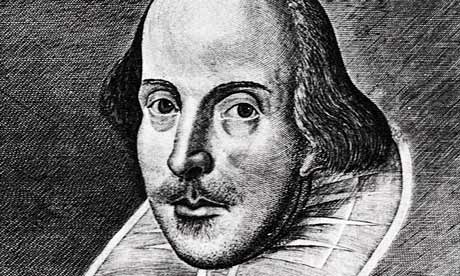Conspiracists ignore a crushing weight of documentary and in-text evidence that the Stratford master authored the plays


Bard likeness … an engraving on the title page of the William Shakespeare's First Folio. Click to see the full image. Photograph: Bettmann/Corbis
In 1593, an actor and theatre manager called William Shakespeare published his first book, a long narrative poem called Venus and Adonis. It is the verbal equivalent of a Titian painting, which recreates the world of mythology in richly human, erotic language. This love poem instantly became a Renaissance bestseller, though today it is far less famous than his plays. But there is something else significant about it. It is one of the many pieces of evidence that add up to an overwhelming sense, beyond any reasonable doubt, that Shakespeare, the actor born in Stratford in 1564, wrote Shakespeare's plays – a quiet proof that conspiracy theories about the authorship of these works, as peddled by the new film Anonymous, are nothing more than destructive absurdities.
The clue is in the date the poem appeared. Shakespeare had never published anything before. He did his writing for the stage, to be performed. So why the sudden rush into print with Venus and Adonis? There is a very striking historical context: in June 1592, plays were temporarily stopped in London by the Tudor authorities due to an outbreak of the plague. William Shakespeare, man of the stage, suddenly had time on his hands. During the closure of the theatres he tried something new – he wrote Venus and Adonis.
This episode, in other words, completely fits the biography of Shakespeare, theatrical genius from the Midlands – as do so many other details in his plays. Shakespeare breathed the theatre. As the RSC edition of his plays vividly stresses, they were written to be acted (which is why they still are). He constantly used theatre itself as a poetic image, as in the famous speech he give Jacques in As You Like It:
If all that is not enough, what about the testimony of people who knew him? In the first complete edition of Shakepeare's works, the dramatist Ben Jonson comments poetically on his friend's portrait. The book begins with an engraved image of Shakespeare – the man from Stratford. It is a good likeness, confirms Jonson – the engraver fought with nature itself for supremacy. But here you only see Shakespeare's face. The portrait cannot capture the mind within: the artist cannot draw Shakespeare's "wit", and "since he cannot, reader, look / Not on his picture, but his book".
Jonson, who knew Shakespeare in the flesh, testifies that the face printed in the First Folio, that of Will Shakespeare, is that of the plays' author. Except he doesn't "testify" because he sees nothing to "testify" about – there was no mystery to Shakespeare's contemporaries about the authorship of Shakespeare's plays. This supposed mystery is a daft later invention.
Anonymous is an insult to a great natural talent. It can only damage and degrade our relationship with our national genius.
- Anonymous
- Production year: 2011
- Country: Rest of the world
- Cert (UK): 12A
- Runtime: 130 mins
- Directors: Roland Emmerich
- Cast: David Thewlis, Derek Jacobi, Edward Hogg, Jamie Campbell Bower, Joely Richardson, Mark Rylance, Rafe Spall, Rhys Ifans, Sir Derek Jacobi, Vanessa Redgrave, Xavier Samuel
This episode, in other words, completely fits the biography of Shakespeare, theatrical genius from the Midlands – as do so many other details in his plays. Shakespeare breathed the theatre. As the RSC edition of his plays vividly stresses, they were written to be acted (which is why they still are). He constantly used theatre itself as a poetic image, as in the famous speech he give Jacques in As You Like It:
"All the world's a stage,Images like this of life as theatre recur richly in his works – from the wooden O of the theatre building itself invoked in Henry V to the play within a play in Hamlet – and they add up to a powerful connection with Shakespeare the man: a man, plainly, who lived theatre so intensely it shaped the way he saw everything else. As any modern actor might say, theatre was his life, his world. Of course it was: he was William Shakespeare, who worked in theatre all his life, and it is this William Shakespeare's experience of life that informs his plays (which also, for that matter, contain reference to his Midlands childhood, such as the Forest of Arden location in As You Like It).
And all the men and women merely players.
They have their exits and their entrances,
And one man in his time plays many parts,
His acts being seven ages."
If all that is not enough, what about the testimony of people who knew him? In the first complete edition of Shakepeare's works, the dramatist Ben Jonson comments poetically on his friend's portrait. The book begins with an engraved image of Shakespeare – the man from Stratford. It is a good likeness, confirms Jonson – the engraver fought with nature itself for supremacy. But here you only see Shakespeare's face. The portrait cannot capture the mind within: the artist cannot draw Shakespeare's "wit", and "since he cannot, reader, look / Not on his picture, but his book".
Jonson, who knew Shakespeare in the flesh, testifies that the face printed in the First Folio, that of Will Shakespeare, is that of the plays' author. Except he doesn't "testify" because he sees nothing to "testify" about – there was no mystery to Shakespeare's contemporaries about the authorship of Shakespeare's plays. This supposed mystery is a daft later invention.
Anonymous is an insult to a great natural talent. It can only damage and degrade our relationship with our national genius.
Không có nhận xét nào:
Đăng nhận xét